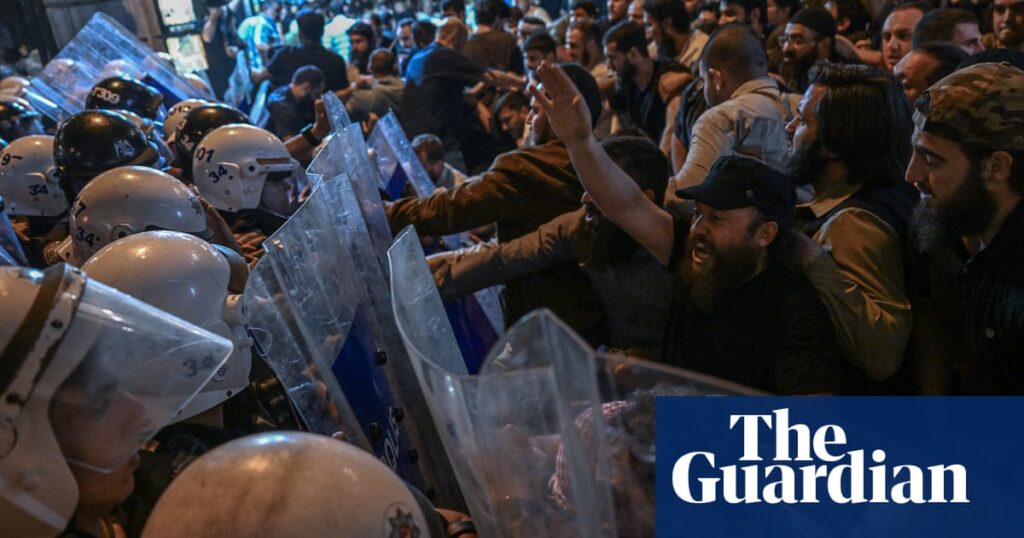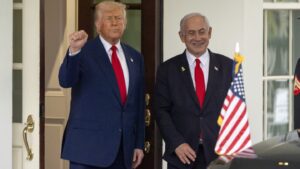
Clashes erupted in Istanbul on Monday as police deployed rubber bullets and teargas to disperse a crowd following allegations that a satirical magazine had published a cartoon depicting the prophet Muhammad. The unrest unfolded after Istanbul’s chief prosecutor ordered the arrest of editors at LeMan magazine, accusing them of “publicly insulting religious values” through the controversial image.
The magazine’s editor-in-chief, Tuncay Akgun, refuted the allegations, asserting that the cartoon had been misinterpreted. “This cartoon is not a caricature of prophet Muhammad in any way,” Akgun told Agence France-Presse. “In this work, the name of a Muslim who was killed in the bombardments of Israel is fictionalised as Muhammad. More than 200 million people in the Islamic world are named Muhammad. It has nothing to do with prophet Muhammad. We would never take such a risk.”
Protests and Arrests
As news of the cartoon spread, dozens of protesters attacked a bar frequented by LeMan staff in downtown Istanbul, leading to clashes with police. An AFP correspondent reported that the confrontation quickly escalated, involving between 250 to 300 people.
Founded in 1991, LeMan is renowned for its political satire and has frequently clashed with conservative elements, particularly after supporting France’s Charlie Hebdo following the 2015 attack on its Paris offices by Islamist gunmen. The attack, which resulted in 12 deaths, was in response to Charlie Hebdo’s publication of caricatures of the prophet Muhammad.
Official Reactions
Turkey’s Interior Minister, Ali Yerlikaya, confirmed on social media platform X that police had arrested the cartoonist responsible for the image, as well as LeMan’s graphic designer. “The person named DP who made this vile drawing has been caught and taken into custody,” he stated. “These shameless individuals will be held accountable before the law.”
LeMan’s editor-in-chief and managing editor were also named in the arrest warrant, according to media reports. In a series of posts on X, LeMan defended the cartoon, claiming it had been deliberately misinterpreted to incite provocation. “The cartoonist wanted to portray the righteousness of the oppressed Muslim people by depicting a Muslim killed by Israel, he never intended to belittle religious values,” the magazine stated. “We do not accept the stigma imposed on us because there is no depiction of our prophet. It takes a very malicious person to interpret the cartoon in this way.”
Broader Implications
The incident has sparked a broader debate on freedom of expression and the limits of satire in Turkey, a country where secular and religious values often collide. Justice Minister Yilmaz Tunc announced an investigation on grounds of “publicly insulting religious values,” emphasizing that “disrespect towards our beliefs is never acceptable.” He further commented, “No freedom grants the right to make the sacred values of a belief the subject of ugly humour.”
Istanbul’s governor, Davut Gul, also condemned the cartoon, criticizing “this mentality that seeks to provoke society by attacking our sacred values.” He stated, “We will not remain silent in the face of any vile act targeting our nation’s faith.”
Historical Context and Future Outlook
This development follows a pattern of tension between secular and religious factions in Turkey, a nation that straddles both Europe and Asia and has a complex relationship with freedom of expression. The 2015 Charlie Hebdo attacks in Paris remain a poignant reminder of the potential for violence when religious sensitivities are perceived to be violated.
Experts suggest that the current situation could further polarize Turkish society, particularly as the government seeks to balance maintaining public order with upholding freedom of expression. The arrests and subsequent legal proceedings are likely to draw international attention, potentially impacting Turkey’s relations with Western nations that prioritize free speech.
As the investigation unfolds, the global community will be watching closely to see how Turkey navigates these challenging waters, balancing its domestic policies with international expectations. The outcome may have lasting implications for the country’s approach to media freedom and religious sensitivity.





